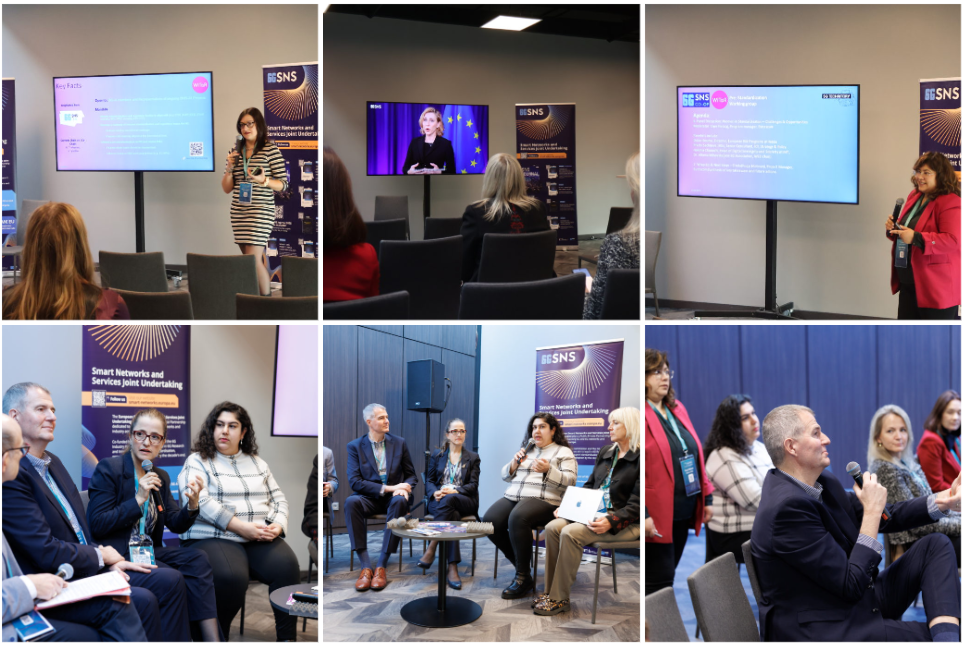Techritory 2025 – WiTaR in Focus: Advancing Research and Pre-Standardisation Synergies in Emerging Technologies

Co-creation Session between the WiTaR & Pre-Standardisation 6G-IA Working Groups at TECHRITORY 2025
Organised in collaboration with the SNS CO-OP project
At the TECHRITORY Forum 2025, the Women in Telecommunications and Research (WiTaR) and Pre-Standardisation Working Groups of the 6G Smart Networks and Services Industry Association (6G-IA) joined forces for a second WiTaR session exploring inclusion, diversity, and stronger research-to-standardisation links in Europe’s 6G landscape.
Setting the Scene
Opening the conversation: why inclusion matters in the research ecosystem, Pooja Mohnani, Project Manager at Eurescom GmbH, opened the session by presenting the purpose and the agenda of the session and how WiTaR exchanges with the broader 6G-IA ecosystem and SNS Joint Undertaking (SNS JU). She reflected on WiTaR’s journey — from a spin-off from the Hexa-X flagship project in February 2021 to its expansion across the whole 5G Infrastructure PPP community in June 2021 and its official launch as the 6G-IA WiTaR WG within the SNS framework in Fall 2023.
Her introduction set the stage for a focused collaboration and how gender equity needs to be integrated across European R&I activities.
Message from the SNS JU
In the address, Erzsébet Fitori, Executive Director of the SNS JU, acknowledged WiTaR for supporting the closing of gender gaps in STEM. “Women in STEM are no longer just a goal — they are a growing reality,” she said, urging the community to “identify gaps, share experiences, and chart actionable pathways towards inclusive leadership.” Her address resonated with the audience and suggested a call to action for an immediate impact.
Understanding the WiTaR and Pre-Standardisation missions
Following SNS JU’s address, Pooja Mohnani provided an overview of WiTaR’s main objectives, expanding reach and activities, including the successful in-person events like EuCNC(from 2022- 2025), ICTON 2025, IEEE PIMRC 2024 and Techritory( 2024-2025). WiTaR offers Lunch Salons, where speakers share their learnings and exchange on diverse topics in ICT and related topics.
Overall, the main emphasis was laid on the emphasis on the importance of purposeful leadership and community-driven innovation. The session reinforced the collective commitment to advancing diversity and inclusion across Europe’s research and innovation (R&I) landscape.
Veronica Vuotto, Veronica Vuotto, Communication, Dissemination & Outreach Specialist at TRUST-IT, presented the Pre-Standardisation WG’s work as their co-chair. She drew attention to the gender gap within technical bodies, noting that “only one in five experts are women.”
Veronica also outlined the WG’s strategic objectives — from aligning R&I outputs with SDOs such as ETSI, 3GPP, and IEEE, to developing a 6G pre-standardisation roadmap that ensures European influence remains both competitive and inclusive.
She highlighted the tool, such as the Vertical Engagement Tracker, developed under the SNS JU, which maps industrial use cases to enhance collaboration and visibility across sectors.
Expert insights: Europe’s leadership in connectivity and innovation depends on its ability to harness all talent
Dr. Rute C. Sofia, leader of the European Task Force on 5G+/6G, stressed that diversity directly impacts research excellence: “When we overlook diversity, we limit innovation.” She described how the INSTAR-6G Task Force is advancing inclusive participation in 6G standardisation, linking technical expertise with EU policy goals. She also invited the community to join various task forces to learn and align in areas like AI, Cybersecurity, Quantum, etc. She also informed about the Human Rights Horizontal Task Force (HTF) – under development, and they plan to propose recommendations for a human rights-compliant society.
Prachi Sachdeva (TNO) reinforced this with an economic argument: “Closing the tech gender gap could add $12 trillion to global GDP by 2025.” Her advice to women entering standardisation work was simple yet powerful: “Find a mentor. Build alliances. Develop soft skills. Ask for feedback early — and participate in social networking events.”Panel discussion: challenges and opportunities for women in standardisation
Moderated by Uwe Herzog (Eurescom), the panel featured Didier Bourse (Nokia), Prachi Sachdeva (TNO), Hakima Chaouchi (IMT), and Dr Albena Mihovska (Aarhus University). Discussions focused on barriers and opportunities for women in standardisation.
Didier Bourse underlined that only 9% of inventors are women, while Hakima Chaouchi urged universities to foster participation in standards work. Albena Mihovska called for bridging research and standardisation to maintain an inclusive innovation pipeline. Summing up, Bourse noted: “True innovation reflects the full spectrum of humanity.”
Outcomes and next steps
The session concluded with synthesising the key takeaways and outlining the next steps for WiTaR and its partners:
- Three new speakers confirmed for upcoming WiTaR Lunch Salons.
- Expansion of collaboration with the European Task Force on emerging domains such as AI, quantum, and advanced networking.
- Renewed focus on mentorship and peer collaboration, strengthening the WiTaR network’s impact within the SNS ecosystem.
Overall, this session was valuable and had both strategic depth and empathy. WiTaR continues to invite all stakeholders – researchers, engineers, policymakers, and forward thinkers – to join this ongoing journey.
More information at https://6g-ia.eu/witar/#Techritory-2025

